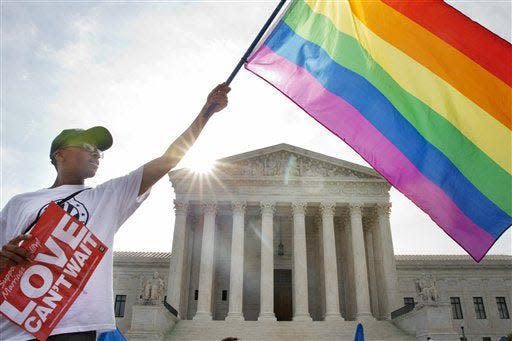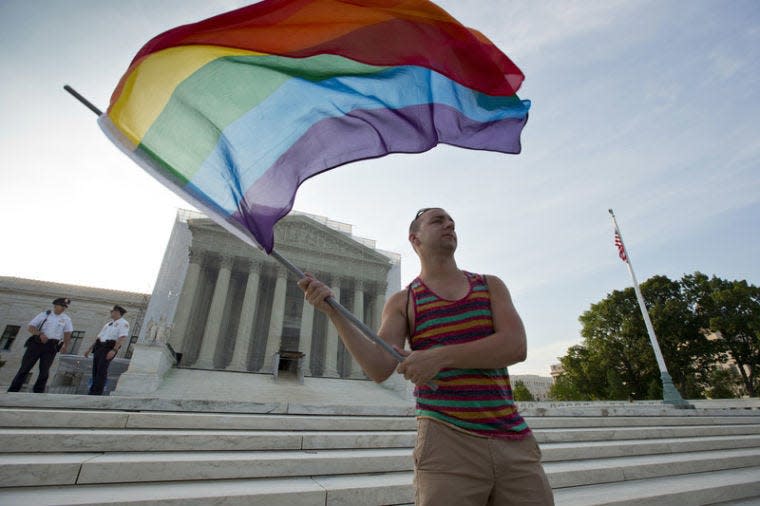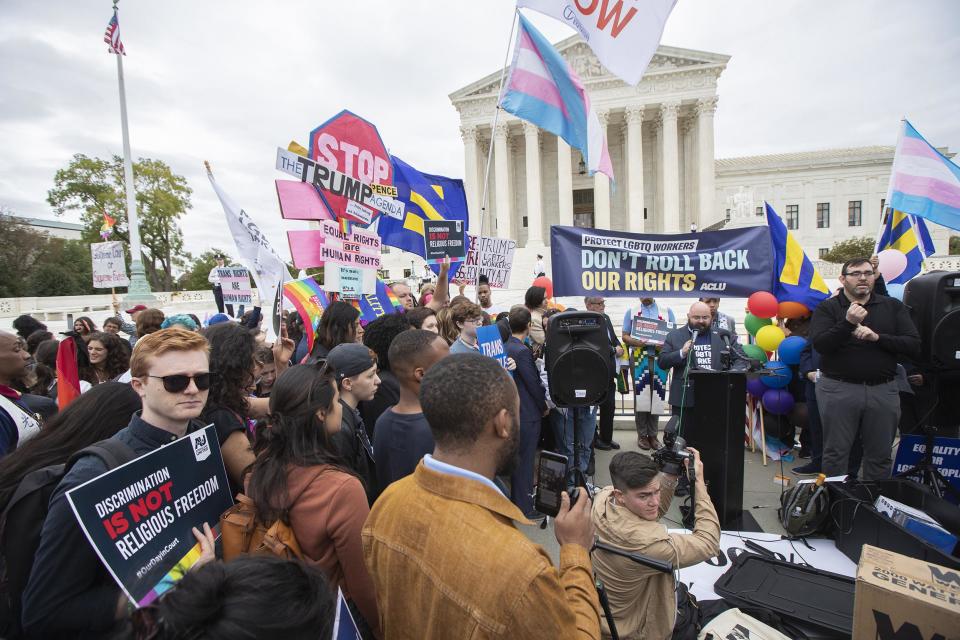SCOTUS overturning Roe v. Wade renews pressure on Kansas same-sex marriage ban, sodomy law
Civil rights activists fear that gay and lesbian couples could lose their marriage rights in the wake of the U.S. Supreme Court overturning Roe v. Wade.
Conservative Justice Clarence Thomas said in his Friday concurrence that the high court should "reconsider" cases establishing rights to engage in gay sex and for same-sex couples to marry.
"This new vision of the Constitution will embolden state legislators to make trouble — but today, it has no immediate legal effects on the right to same-sex marriage or same-sex intimacy," the Human Rights Campaign said in a statement.
Gay marriage and gay sex remain legal in Kansas and the United States. But four of the nine justices believe the legal reasoning in Friday's Dobbs decision could be used to overturn other cases establishing constitutional rights.
The court opinions carry additional weight for LGBT Kansans, where a state statute remains on the books to criminalize sex between consenting same-sex adults and the state constitution has a ban on same-sex marriage.
"This is a wrecking crew, and the wrecking crew is demolishing rights that Americans have fought for for decades, if not centuries," said Tom Witt, of Equality Kansas. "Not for a long time has our Constitution been used to take rights away from people."

Clarence Thomas argues a duty to 'correct the error'
Thomas's view wasn't shared by the other conservative justices. The majority, led by Justice Samuel Alito, doesn't believe its ruling will have an affect on other rights.
"We emphasize that our decision concerns the constitutional right to abortion and no other right," Alito said. "Nothing in this opinion should be understood to cast doubt on precedents that do not concern abortion."
Thomas agreed that the abortion opinion doesn't immediately apply to unrelated issues but argued that similar legal reasoning should be used to overturn other cases.
"In future cases, we should reconsider all of this Court's substantive due process precedents, including Griswold, Lawrence, and Obergefell," Thomas said. "We have a duty to 'correct the error' established in those precedents."
Those three cases established the rights to use contraception, to engage in private and consensual sodomy, and to same-sex marriage.
As part of their dissent, liberal Justices Stephen Breyer, Elena Kagan and Sonia Sotomayor argued the legal analysis from their conservative colleagues undermines those cases.
"No one should be confident that this majority is done with its work," Breyer said. "The right Roe and Casey recognized does not stand alone. To the contrary, the Court has linked it for decades to other settled freedoms involving bodily integrity, familial relationships, and procreation."

"Either the mass of the majority's opinion is hypocrisy, or additional constitutional rights are under threat," he said. "It is one or the other."
Alito dismissed their concerns.
"Perhaps this is designed to stoke unfounded fear that our decision will imperil those other rights," he said.
More: Roe v. Wade was overturned. How does Kansas abortion change after the Supreme Court ruling?
'Take the man at his word' of Clarence Thomas
Witt disputed that the fear is unfounded.
"Did they not read Justice Thomas's concurring opinion, where he said that it's time for the court to come after those things?" Witt said. "Do we take these people at their word or not? When the longest serving justice of the Supreme Court ... says we're coming after you next, I would take the man at his word."
Brittany Jones, a spokesperson for Kansas Family Voice, said the Supreme Court didn't open the door to overturning other decisions.
"The court was extremely clear, and they reiterated over and over again, that they weren't questioning those opinions, that they were a separate kind of understanding and they fell under a very different question of law," Jones said. "I think we can have discussion about what that looks like for other substantive due process rights ... and that's a whole other discussion for another day."
Rep. Brandon Woodard, D-Lenexa, has tried to push through legislation to codify LGBT rights.
"Each time we've approached legislative leadership or committee chairs, we've been told that our bills are non-issues because they've been settled by the Supreme Court, with regard to employment discrimination, with regard to marriage equality," Woodard said. "Today's opinion shows that those are not non-issues."

He would like to see existing laws modernized.
"Otherwise, we're looking at going back to a time when we are criminalizing LGBT people for being who they are or who they love," Woodard said. "This Supreme Court has proven that they are extremist activists that have clearly shown that they are willing to upset precedents, and I feel that LGBT people are next on their target list."
More: Kansas voters first to weigh in on abortion post-Roe v. Wade as procedure remains legal
LGBT legislation stalls in Kansas' Republican-controlled Legislature
Kansas Democrats have tried to push through legislation on LGBT rights.
The state has anti-sodomy laws on the books. The criminal sodomy definition in Kansas includes gay sex among consenting adults, despite the provision being unconstitutional under Lawrence v. Texas. Breaking the law is a misdemeanor.
Rep. John Carmichael, D-Wichita, the top House Democrat on judiciary issues, tried to change that this year. His bill, HB 2009, would have nixed the line in the sodomy statute criminalizing same-sex intimacy.
A fiscal note indicates that the Office of Judicial Administration couldn't estimate the number of fewer criminal cases if the bill were to pass. The bill died in committee after never receiving a hearing.
The Kansas Constitution bans same-sex marriage and civil unions. The ban, which voters overwhelmingly added to the constitution via an amendment in 2005, is not in effect because a federal judge ruled it unconstitutional under federal case law.
The state also has a law banning recognition of same-sex marriage on the books, Witt said.
Woodard proposed a new amendment in HCR 5011 to remove the ban on same-sex marriage. His resolution never had a hearing before it died in committee.

Witt said House GOP leadership blocks LGBT rights bills from advancing to the floor. He believes the bills could pass the Legislature if they were put up for a vote.
More: Top Kansas Republicans won't say if they will push model abortion ban if voters amend constitution
In February, as Republicans pushed through one of several constitutional amendment proposals this past session, attempts from Democrats to tack on their proposals were shot down.
"It's frustrating because ... we can't even get a hearing," Woodard said at the time on the House floor. "Not a single hearing on this or any other equality issue since I've been here."
Now, Woodard said he is hopeful that elections this year will produce new leadership in the House and its committees. He also believes that a majority of Kansas voters would amend the state constitution to legalize same-sex marriage.
"I'm optimistic that we can at least finally have the conversation," he said. "With new leadership hopefully comes a willingness to have genuine discussion about issues like this."
Jason Tidd is a statehouse reporter for the Topeka Capital-Journal. He can be reached by email at jtidd@gannett.com. Follow him on Twitter @Jason_Tidd.
Andrew Bahl of The Capital-Journal contributed reporting.
This article originally appeared on Topeka Capital-Journal: Why SCOTUS renews pressure on Kansas gay sex crime, LGBT marriage ban

